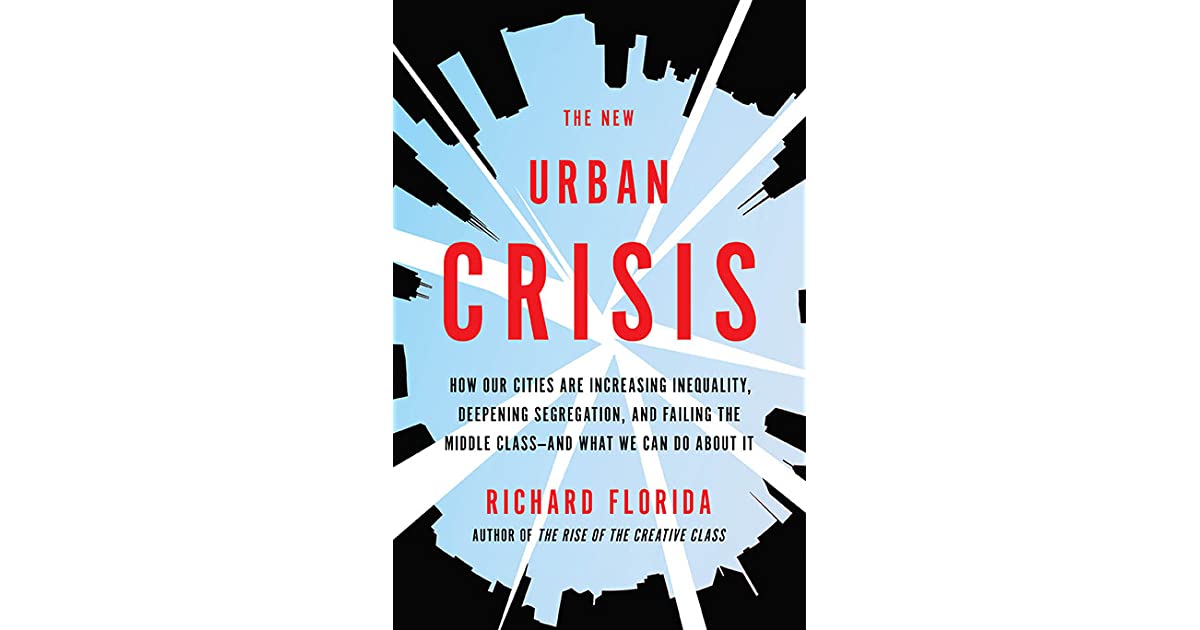Post
BOOK REVIEW | The New Urban Crisis
16 Apr 2020
The New Urban Crisis: How Our Cities Are Increasing Inequality, Deepening Segregation, and Failing the Middle Class-and What We Can Do About It
By Richard Florida
Reviewed by Peter Murray
I began reading The New Urban Crisis on the day that Duncan Bowie gave the introductory lecture to the London Society’s Saturday Morning Planning School. Duncan, a senior lecturer at the University of Westminster and former advisor to Ken Livingstone when Ken was Mayor, went through the key chronologies of recent London planning policy: the Green Belt in the 1930s to contain urban sprawl; controlling population concentration through density controls from the 1940s; the world city focus of the 1990s; compact city and densification from 2000. Bowie made no mention of Richard Florida’s ideas about the creative city, which had such an influence on mayors around the world during the noughties.
Florida’s The Rise of the Creative Class (2002) identified the growing importance of creativity in a wide range of jobs – not just in the arts but computer science and maths, architecture and engineering, social sciences, media, finance, healthcare and education – and how clustering them together in cities was becoming a key driver of economic growth. Fifteen years later, this new book acknowledges the downside of this concept. It sets out detailed research showing creative clustering as the engine not just of economies but of increasing inequality and exclusion in cities, of skyrocketing housing prices and the spread of gentrification.
After his talk, Bowie told me that he took a certain delight at Florida’s mea culpa: 'I always thought the creative city was nonsense.' I’m not sure he’s right. There is no getting away from the fact that London has hugely benefitted economically from the clustering of financial services in the City of London, tech businesses in Shoreditch, and education and medical sectors in Bloomsbury and King’s Cross.
So what’s going wrong? According to Florida it’s the rise of ‘winner-take-all urbanism’. The high cost of land and the intense competition for urban space, fuelled by overseas investment and absentee landlords has turned real estate into a new form of ‘global reserve currency’. Supercities dominate wider economies: London comprises a massive 30 per cent of the entire economic output of the UK. The situation is exacerbated by NIMBYs who not only fight to preserve their own housing values but put a ‘brake on the very clustering that drives innovation and economic growth,’ and are dubbed ‘New UrbanLuddites’. Unlike the original Luddites, these are not exploited workers but some of the biggest winners of winner-take-all urbanism. The book recognises the issues of gentrification but suggests that chronic, concentrated urban poverty is a far greater problem.
Much of Florida’s analysis, which focuses in large part on cities in the US and UK, will come as little surprise to observers of physical and economic planning in London. Neither will some of his solutions, such as ‘invest in the infrastructure for density and growth’, and ‘build more affordable housing’. He presses the idea of a land value tax (LVT), which would create incentives for property owners to put their land to most intensive use, capturing the uplift in value from development; last year the London Assembly proposed that the Mayor investigate the idea of an LVT to replace council tax, business rates and stamp duty. Florida also says that suburbs must become denser, greener, more mixed use and more connected to urban centres via public transport.
Florida puts rather too much blame for the levels of rising inequality on city planning and economics. There are also national and international political drivers: Conservative housing policies, taxation regimes that favour the wealthy, global corporations that avoid taxation, the near disappearance of unions, and disruptive technologies. Perhaps Florida’s most important recommendation is to ‘empower cities and communities’. As the LSE’s Tony Travers has written in the London Finance Commission report, Government control ‘limits the ability of London’s government to tailor provision at the local level or to align funding and delivery to provide high-quality services and achieve greater cost efficiencies. Devolution to London would allow the city’s government to develop bespoke policy for its citizens and manage its budget efficiently across areas of policy.’ For London at least, greater devolution is the key to addressing the challenges of the new urban crisis.
